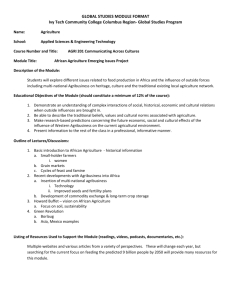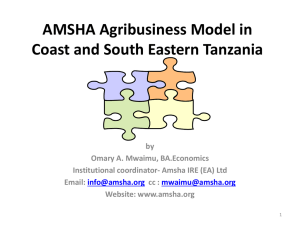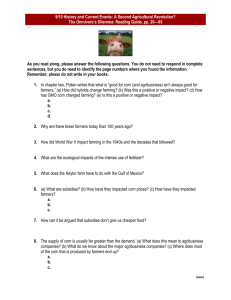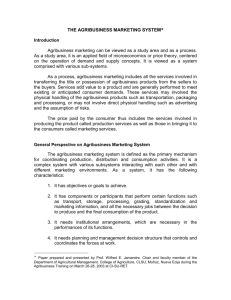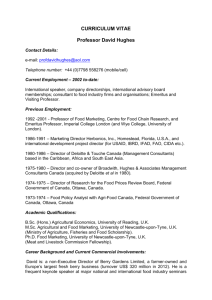Presentation-by-Professor-Ashutosh-Singh
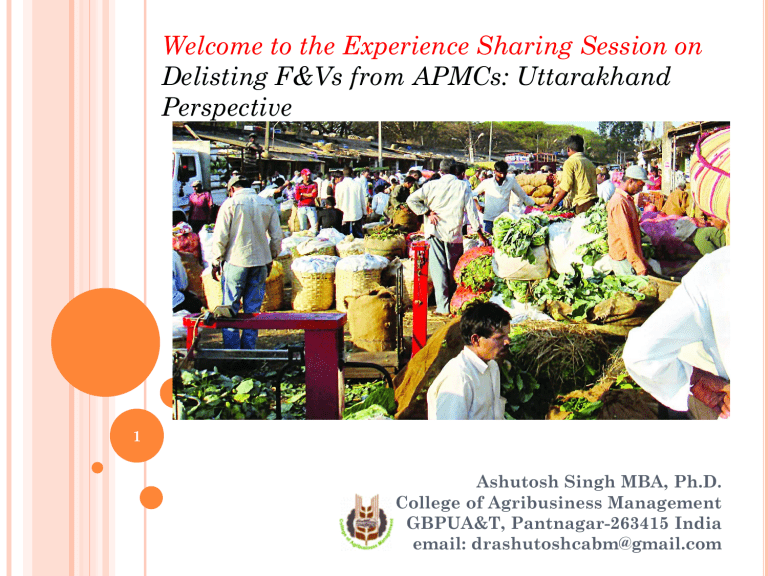
Welcome to the Experience Sharing Session on
Delisting F&Vs from APMCs: Uttarakhand
Perspective
1
Ashutosh Singh MBA, Ph.D.
College of Agribusiness Management
GBPUA&T, Pantnagar-263415 India email: drashutoshcabm@gmail.com
I NDIA …….. A LAND OF OPPORTUNITIES
•
•
•
•
•
•
•
•
•
•
•
•
52% cultivable land as against 11% world wide
Unsurpassed Natural Advantages
All the 15 major climates of the world
46 out of the 60 soil types
17% animal, 12% plant and 10% fish genetic resource of the world
Second largest producer of fruits and vegetables
Aims to double its horticulture production to 350 million tonnes by 2015
Horticulture contributes nearly 28 per cent of GDP and 54 per cent of export share in Agriculture from the cultivated area share of 8.5% only
Tremendous scope of increasing production and exports in Horticulture
The marketing of F&V in India is changing drastically
Change from the traditional markets to modern formats
Entry of Reliance Fresh, Choupal Fresh, Namdhari’s Fresh, Premium
Farm Fresh etc.
2
College of Agribusiness Management 05/09/2014
G ROUND R EALITY - A C ONTRAST
The largest grower of fruits – 15% of world output
Low share of global Exports at 0.5%
The second largest grower of vegetables – 11 % of world output
Low share of global exports at 1.7%
High Cost of Production fruits, vegetables & flowers
Low farmer income
Cold storage facility available for only 10% of produce
Farmer sells immediately due to perishability & absence of proper infrastructure to keep it for longer period
Post Harvest wastage of fruits & vegetables – 18 to 30% valued at over Rs
45,000 crores
Losses as above in India is more than consumption of same in UK
Farm gate price 25% of domestic consumer retail price against 50% in developed countries.
3
College of Agribusiness Management 05/09/2014
W HAT A F ARMER T HINKS ?
Agrees that a lot is being done for ‘Reviving Agriculture’
But of what use if he can not be facilitated to sell his produce?
Wish to have ………
A Remunerative Price for his blood and sweat
Decide over his Buyers
At a Place and Time Convenient to him
Escape the fleecing of multiple intermediaries
College of Agribusiness Management 05/09/2014
4
A GRICULTURAL M ARKETS IN I NDIA
No. of Regulated Markets – 7246
No. of Principal Market Yards- 2433
No. of Sub Market Yards - 4813
No. of Rural Primary Markets - 21238
No. of Wholesale Markets 6,539
Availability of Markets
Average area Served by a Market
Av. Area Served by a Regulated
Market
Area served per Regulated Market
Area Served
115 sq. km
454 sq. km
Varies from 103 sq km in
Punjab to 11,215 sq km in
Meghalaya
Average approx. 80 Km Recommendations by National
Farmers Commission - Availability of
Markets within 5 km radius
College of Agribusiness Management
As on 31.3.2011 CSO, Govt. of India
05/09/2014
5
S TATE WISE P ROGRESS OF A MENDMENTS IN APMC ACT
College of Agribusiness Management 05/09/2014
6
U TTARAKHAND : S NAP SHOTS
Statistics
Geographical Area- 53484 Sq. Km.
Population- 1.01 Crore
Decadal Growth Rate – 19.17 %
Density of Population- 189/Sq. Km.
Urban to Total Population- 30.49 %
Sex Ratio (Females/ 1000 Males)- 963 against 940
Literacy Rate- 79.60 against 74% NA
Per Capita Income-Rs. 90843 (FY 2012-13) against Rs. 74920 NA
4.6 million ha (86%) is hilly area and 0.74 million ha (14%) is plain area.
Only about 14 percent of the geographical area is cultivable
Agriculture contributes 23.4% in State Domestic Product
The average size of land holding in the state is 0.95 ha against
NA of 1.57 ha.
College of Agribusiness Management 05/09/2014
7
APMC SET UP IN U TTARAKHAND
25 PMYs, 31 SMYs, 27 WMs
Revenue generated 61.31 Cr in
11-12 and 90.32 Cr. in 12-13
3 WSM under Mini Mission-III at Dehradun, Haldwani,
Haridwar
Established Uttarakhand
Horticulture Marketing Board
FCI has 02 Lakh MT storage capacity in the state with utilization level of 82%
Total 15 cold storages (1 in Cooperative, 2 in Public and 12 in
Private sector)
One CA storage of 1000 MT for
Apples in Naugaon, Uttarkashi
8
College of Agribusiness Management 05/09/2014
APMC J OURNEY S O F AR ….
To ensure selling of agricultural produce only in the government regulated markets
APMC Act has helped mainly the medium and small farmers to access orderly market places
Farmers have to transport their produce over long distances
Most of these markets have limited facilities — only 9 per cent offer cold storage, and only 33 percent have grading facilities.
Private Sector is willing to invest in agriculture sector but regulations such as the APMC Act pose a major hurdle
As a consequence, private investment in agriculture and allied sectors has remained negligible
Many of the APMCs don’t have adequate infrastructure to support efficient trading
9
College of Agribusiness Management 05/09/2014
H AS THE APMC BEEN ABLE TO SERVE THE PURPOSE ?
Limited interest have been served of small farmers
In many states, the regulated markets are non-functional.
Out of 35 states and UTs only 17 has amended it by November
2012.
The catchment area of regulated markets also varies drastically ranging between the plain, hilly and NE states
Impose substantial taxes on buyers over and above the commissions and fees
Only registered traders/commission agents can transact in the markets
Without amending APMC Act, the entry of private players is restricted, No Contract farming, No Farmer-Consumer Market
College of Agribusiness Management 05/09/2014
10
F OCAL P OINTS FOR T ODAY …
Will it enable farmers to sell directly to consumers/buyers and avoid traders/commission agents?
Does the farmer sell at the APMC market even today?
Will the buyers get F&V at a cheaper price?
Revenue generated by Mandi Board?
Is there any threat from corporate buyers to procure directly from the farmers?
How will they reach farmers immediately?
What happened in Bihar and Andhra Pradesh ?
11
College of Agribusiness Management 05/09/2014
F&V S UPPLY C HAIN C ONSTRAINTS
Predominantly marginal or small farmers – Hence small marketable surpluses and limited bargaining power
Poor availability of markets & monopolistic tendencies of APMCs
Inadequate infrastructure in wholesale markets/ rural primary markets
Lack of fair price discovery mechanism
Multiple and exploitative intermediaries – low returns
Fragmented supply chain, poor cold chain & high post-harvest losses
Lack of cleaning, grading, standardization, packaging & quality certification facilities
Limited access to market information and marketing opportunities available
Leading into:
Low Exportable Produce
Farmers getting very less share in consumers’ rupee
12
College of Agribusiness Management 05/09/2014
Pictures speak better than words……………
College of Agribusiness Management 05/09/2014
13
College of Agribusiness Management 05/09/2014
14
College of Agribusiness Management 05/09/2014
15
College of Agribusiness Management 05/09/2014
16
College of Agribusiness Management 05/09/2014
17
T RANSPORTATION OF FRUITS AND VEGETABLES
College of Agribusiness Management 05/09/2014
18
F&V SUPPLY CHAIN : I NDIA V / S D EVELOPED COUNTRIES
India
Farmer
Consolidator
Commission agent
Trader
Wholesaler
Retailer
Consumer
Developed countries
Farmer
Wholesaler/Retailers
College of Agribusiness Management
High wastage and low margins
Consumer
High investments –
Low wastage - better margins
19
05/09/2014
F&V PRODUCTION SCENARIO IN U TTARAKHAND
Year
2008-09
2009-10
2010-11
2011-12
2012-13
Fruits Vegetable
Area (000’ha) Production
(000’MT)
Productivity
(MT/ha)
Area (000’ha) Production
(000’MT)
Productivity
(MT/ha)
171.71
193.80
197.62
200.73
200.85
725.27
723.60
752.56
802.12
805.67
4.22
3.73
3.80
4.00
4.01
81.82
82.60
86.87
89.29
88.03
1077.55
997.20
1023.45
1066.71
1059.57
13.16
12.07
11.78
12.00
12.03
Source: NHB, 2012
20
College of Agribusiness Management 05/09/2014
F RUIT PRODUCTION SCENARIO IN U TTARAKHAND
(000'MT)
Fruits
Mango
Citrus
Apple
Pear
Peach
Plum
Khumani
Wallnut
Litchi
2009-10
120.8
126.6
114.0
102.78
47.34
40.01
30.67
20.56
15.7
2010-11
135.3
134.5
135.9
105.45
48.56
40.56
31.34
21.19
18.7
% growth over previous year
12.00
6.2
19.21
2.59
2.57
1.37
2.18
3.06
19.10
20011-12
147.79
138.45
122.65
108.10
49.68
41.22
32.26
21.82
19.01
Source: Directorate of Horticulture, Uttarakhand 2012-13
% growth over previous year
9.23
2.93
-9.74
2.51
2.30
1.62
2.93
2.97
1.65
21
College of Agribusiness Management 05/09/2014
Tomato
Pea
Cabbage
Reddish
Frenchbean
Onion
Cauliflower
Okra
Brinjal
V
EGETABLE PRODUCTION SCENARIO IN
U TTARAKHAND (000'MT)
Vegetable
95.60
71.0
68.1
55.34
38.45
40.50
34.6
24.6
24.6
2009-10 2010-11
97.1
86.9
70.5
56.45
39.54
38.0
34.0
27.1
25.9
3.52
2.00
2.83
-6.17
-1.73
Growth over previous year
(%)
1.56
2011-12
102.39
22.39
78.05
10.16
5.28
72.70
57.96
40.05
39.27
36.67
27.90
27.04
Source: Directorate of Horticulture, Uttarakhand 2012-13
3.12
2.51
2.56
3.34
7.85
Growth over previous year
(%)
5.44
-10.18
2.95
4.40
22
College of Agribusiness Management 05/09/2014
P OST HARVEST LOSSES IN FRUITS AND VEGETABLES
Activity
Malta
S and M Large
Physical losses at the level of farmers
1.12
0.06
Harvesting
Sorting and
Grading
Packaging
2.23
0.14
0.24
Loading 0.19
Transportation 12.78
Unloading 0.98
Weighing and losses at wholesale level
Total loss
0.67
17.23
10.12
0.12
0.08
7.78
0.78
0.09
Losses (in kg.) per quintal
Tomato
S and M Large
Pea
S and M
5.12
0.21
0.84
0.59
19.58
1.28
1.34
28.96
3.23
0.19
0.78
0.56
15.87
1.87
0.98
23.48
3.46
0.19
0.35
0.45
9.78
1.09
0.91
16.23
Large
2.87
0.11
0.24
0.43
6.43
0.89
0.78
11.75
23
College of Agribusiness Management 05/09/2014
Experiences in the Other States ……
College of Agribusiness Management 05/09/2014
24
P UNE E XPERIENCE
National Initiative for Vegetables in Urban Clusters
Maharashtra State Agricultural Marketing Board
(MSAMB) was to help the farmers’ groups market their products directly in Pune, Mumbai and Nagpur.
MSAMB’s role was to help groups identify potential markets and provide subsidies in setting up kiosks, refrigerated vans and logistic support
68 farmers’ groups are directly selling their products at 226 locations in Pune and Pimpri-Chinchwad
Lack of proper marketing and awareness is making it difficult
College of Agribusiness Management 05/09/2014
25
A PNI M ANDIS
After studying the concept of “Saturday Market” prevalent in U.K and U.S.A, the Punjab Mandi Board decided to organize “Apni Mandis” 1987 at S.A.S Nagar,
Mohali (Punjab)
The number of farmers participated - 10,278 (1988) which has been increased to 4,14,610 (2012).
Sale of produce - Rs. 2,96,24,761/- (1988) which has been increased to Rs. 82,13,49,474/- (2012)
College of Agribusiness Management 05/09/2014
26
R YTHU BAZAAR
Rythu bazaar is run by Government of Andhra
Pradesh for small farmers with small landholdings.
No market fees is collected from the Farmers of Rythu
Bazars.
All facilities are provided to Farmers with free of cost
Rents are being collected from Self-Help Groups & Govt.
Agencies only
College of Agribusiness Management 05/09/2014
27
S AMRIDDHII : MBA SABZIWALLAS STRIKE GREEN GOLD
Samriddhii (Jan,2008) is capable of creating livelihood opportunities to ensure economic empowerment of hitherto marginal farmers.
Touched the lives of more than 7,000 farmer families and 500 vendors.
Samriddhii Rs. 7,50,000 (2008-09) - Rs. 2.60 crore (2011-12)
College of Agribusiness Management 05/09/2014
28
I NTERVENTIONS : AC CARTS
Keeps vegetables fresh for longer period
Maintain the temperature of 5 to 15 degree Celsius depending on the surrounding temperature
Light weight ( only 70 Kg)
Carry more weights ( can carry upto 200 kg vegetables)
Better display of vegetables ( 10 different compartment)
Easy to pull & push
Space for advertisement – helps vendors in earning more income per month
29
College of Agribusiness Management 05/09/2014
C ASE OF A PPLE G ROWERS OF H IMACHAL P RADESH
To assess the awareness and perception level of apple growers towards amended APMC Act
To analyze the impact of amended APMC Act on production practices, post harvest management practices and marketing practices of producers and
To evaluate the efficiency of traditional and modern supply chain.
30
College of Agribusiness Management 05/09/2014
A NALYSIS OF M ARKETING C HANNELS
College of Agribusiness Management 05/09/2014
31
M ARKETING C OST AND N ET R ETURN UNDER
D IFFERENT M ARKETING C HANNELS IN G ROUP 1
N=58
College of Agribusiness Management 05/09/2014
32
M ARKETING C OST AND N ET R ETURN UNDER D IFFERENT
M ARKETING C HANNELS IN G ROUP 2
College of Agribusiness Management 05/09/2014
33
G ROWER ’ S S HARE IN C ONSUMER ’ S R UPEE AND P RICE S PREAD
TRADITIONAL C HANNEL
C ORPORATE C HANNEL
College of Agribusiness Management 05/09/2014
34
U TTARAKHAND ’ S INITIATIVE
Opening 50 Apnu Bazar
One is operating at Nanurkhera
Three more are planned at Danda Lakore, Maziri Grant and
Garuda
Shed, Godown and Electronic Weighing
No other retail outlet within the 100 meters
No Marketing Fee as against 2% Marketing fee and .5%
Development cess charged in APMCs
Delisting of 93 agriculture produces (fruits and vegetables)
Mandis at least in seven places in hilly areas
Loss of Rs 8-9 crores on the revenue generated
35
College of Agribusiness Management 05/09/2014
A PPLE S ERVICE PROJECT OF UTTARKASHI
Pilot basis in April 2007 in Syuri-Nogoan and Dhari-Kafnol village of Uttarkashi
Consortium partners Fresh Food Technology (FFT), Agriculture & Organic Farming
Group (AOFG) and Shri Jagdamba Samiti (SJS) under the financial assistance of SHGW
(A Private Dutch foundation)
Initially 880 apple growers were covered under social business model
Eliminate well organized intermediaries who controlled the entire process from credit supply for farm inputs, transportation to the marketing of the produce
Engaged small and marginal farmers in the apple value addition business chain
Four collection centers and five grading centres (2 in Naugaon, 1 in Purola, 1 in
Chakrata)
Farmer organizations become equal business partners with the private sector parties and a social investor
Resulted in creating more employment, income, technical skill and local capacity for the apple growing farmers
Apple from Harsil, Taknor, Tyuni, Parola and Naugaon is now being sold in cities like
Delhi, Varanasi, Kanpur and Lucknow 36
College of Agribusiness Management 05/09/2014
B USINESS PREPOSITION
During the apple season of 2011-12 880 participating farmers got prices of
Rs 40 to Rs 55 per kg from the collection point companies. A total of 430
MT of apples were procured and these apples were sold to the storage company at the rate of Rs 55 to Rs 65 per kg. FFT Himalayan Fresh Fruit sold these apples between February and April 2012 in the markets of
Varanasi, Delhi, Dehradun and Jaipur at the rate of Rs 75 to Rs 85 per kg. A net profit of Rs 7 lakh (Rs 1.80 per kg) was earned in this regard by the company. The collection centres also earned a net profit of Rs 5 lakh
(Rs 1 per kg)
Out of Rs 1, the collection point joint venture distributed a premium of Rs
0.25 per kg in cash on August 15, 2012, with a shareholding of Rs 0.25 per kg. The remaining Rs 0.50 went to the collection point company for capitalization
Out of the total profit of Rs 7 lakh earned by the FFT Himalayan, a premium of Rs 0.50 per kg was given to the farmers. Besides, a shareholding of Rs 1 per kg was given to the 880 participating farmers.
The farmers got Rs 2 per kg as added price as additional payment for their apples, besides other benefits like immediate cash payments, training support, saving of time and risk in selling apples to the middlemen
College of Agribusiness Management 05/09/2014
37
R EACTIONS ON THE MOVE ………..
“APMC is needed for all classes of farmers. While arhatiyas provide finance and assurance of a fair price for agriculture produce, they also provide funds to farmers in dire need. Small farmers cannot afford to hire a vehicle and bring their produce for direct selling; arhatiyas bring these to APMC.”
Sanjay Bhujbal, Arhatiya for vegetables at the Vashi APMC in Navi Mumbai
“
An APMC yard is an important place for small vendors to sell their produce. However, the
Act must allow free flow of goods across the country. The farmer must have the right to decide the buyer of his produce. The APMC yard must be made modern, with excellent handing facility, ripening and cold chambers”
K Radhakrishnan, Director, Freskins Retail Chain
“Waiving of market fee and cess will put an additional burden of Rs 7.25 crore on the state exchequer. We expect the prices of vegetables and fruit to fall by 10 per cent. The government is yet to implement the Act in its spirit, which seeks to promote contract farming, bring reforms in agriculture, provides for better regulation of marketing agricultural produce and establish a more efficient marketing system.”
Harak Singh Rawat, Agriculture Minister , Govt of Uttarakhand
College of Agribusiness Management 05/09/2014
38
College of Agribusiness Management 05/09/2014
39
D IGITAL SCREEN AT MANDI GATE
College of Agribusiness Management 05/09/2014
40
W HOLESALERS ARE UPLOADING FRUITS AND
VEGETABLES AT MANDI
College of Agribusiness Management 05/09/2014
41
College of Agribusiness Management 05/09/2014
42
T RADER ’ S P LATFORM
College of Agribusiness Management 05/09/2014
43
EXPECTED IMPACT OF DELISTING OF F&V
FARMERS
Access of Farmers to Consumers
Facility for Loans and Advances
Time Consumed in Transaction
Grading and Sorting
Packaging Cost
Transportation Cost
Price Awareness before Sale
Fair Price Realization
Rejection Rate
Fluctuating Demand due to Seasonality
INTERMEDIARIES Squeezed Commission
44
College of Agribusiness Management 05/09/2014
MARKETING BOARD
Role in Private Yards
Lack of Consistent Supply
Lack of Post Harvest Handling Infrastructure
PRIVATE PLAYERS
Availability of Quality Raw Material
Consistent Supply
CONSUMERS
Just in Time
Logistic Issues
Economy in Procurement
Private Cartels
Availability of E&V at Cheaper Price
Point of Purchase
45
College of Agribusiness Management 05/09/2014
R OAD M AP FOR F UTURE ….
Challenges Strategies
Ensuring Direct Contact between Farmer and Consumer
Limiting the role of Intermediaries
Avoiding Distress sale
Continuous Supply to Processors
Market Intelligence
Contract Farming
Developing linkages with farmers
Restricting Marketing Cartels
Linking small farmers to the modern food retail chains
Promoting multi mutually independent players
Farmer’s training in pre and post harvest management practices
Economical packaging technology for
F&V
Integrated cold chain & logistics infrastructure
MIS Support at Village Panchayat level
Enabling regulations
46
College of Agribusiness Management 05/09/2014
THANKS!
College of Agribusiness Management 05/09/2014
47
